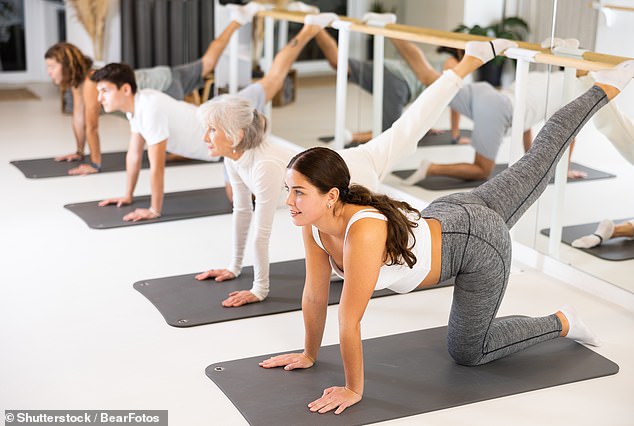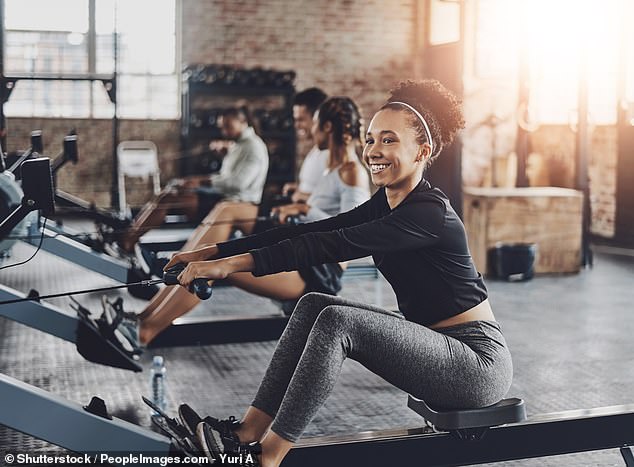Attending yoga classes several times a week has been the trendy form of exercise among women for decades, but it may not be beneficial in the long term.
Dr Zac Turner, a Sydney-based preventive health and wellness specialist, has shared what he considers his “ideal” exercise routine.
And repeating the same activity over and over again is a big no-no.
Instead, he recommends a combination of exercises throughout the week and advises against focusing on just one type of movement, such as yoga, because this will result in limited health benefits.
“I have patients who do five yoga classes a week, but life is full of many different challenges,” Dr. Turner said.
‘While yoga is great in many ways, it won’t give you what you need for cardiovascular support. Even if you reduce stress and cortisol, you won’t build up many of the things needed for Alzheimer’s and dementia prevention, like lactic acid.
The secret to a successful week of exercise is variety, and Dr. Turner suggests four key components: yoga, weights, cardio and Pilates.
‘The biggest mistake people make is not doing a variety of exercises. People go and lift weights but avoid yoga because they want muscles. Yoga is important not only to be elastic, but to have strong bones. And going for a walk is really good, but it won’t help strengthen your upper body or bones in the long term.’
Preventative health and wellness specialist Dr. Zac Turner has shared what he considers his “ideal” exercise routine, and repeating the same activity over and over is a big no-no.
Assuming you have an hour of free time a day to exercise, Dr. Turner says you should do it.”15 minutes of Pilates and stretching to warm up the body, followed by 15 minutes of cardio for heart health and then 15 minutes of weights to strengthen bones.
“I recommend ending with 15 minutes of yoga to meditate.”
While many choose running as a cardiovascular exercise, there is no one-size-fits-all approach to this form of exercise, especially for people with more limited mobility.
‘People always think about running, but for many it is not an option. There are many other low-impact things you can do to improve your hips and knees.’
Dr. Turner is a big proponent of rowing, which in addition to being “gentler on the hips and knees,” is also “probably the best all-around cardiovascular exercise.”
Five to 10 minutes on a rowing machine can be equivalent to 20 to 30 minutes of running, for example.
Dr. Turner also says you should rethink how you start your day: “It’s less about getting nutrients and more about eliminating toxins when you wake up in the morning.”
‘Wake up, drink 500ml of water and avoid calories for the next hour. Without fat, sugar or protein. Try drinking green tea or herbal tea, or two shots of coffee.
‘If you can sunbathe early in the morning, it’s even better. The wavelength around 8am is really important to allow you to absorb vitamin D in the middle of the day.
“Sunlight also regulates the pineal gland and sleep cycles.”

Dr Turner attends Pilates or yoga classes on Monday, Tuesday and Wednesday mornings, but also makes sure to incorporate more strenuous strength exercises into his week (file image).
How should you structure your workouts throughout the week?
As for his weekly routine, Dr. Turner practices Pilates or yoga on Monday, Tuesday and Wednesday mornings, and then does something more intense.
“Then I do a more intense cardio or weight training session,” he said. ‘I like to do a kickboxing or boxing class because it’s very good for brain health.
‘Alternate between what you are looking for, don’t exhaust yourself. It’s not about going to the extreme every day of the week, but also about having lighter and restful days.’
On Thursdays, Dr. Zac focuses on his upper body strength by doing bench presses, shoulder exercises, and bicep curls.
He recommends ending the week on a Friday with high-intensity interval training (HIIT).
“I also get in the pool on Friday or paddle a little more,” he said. “I also change it to a sauna or an ice bath.”
On Saturdays, Dr. Turner has more free time and does longer exercises, but He recommends resting on Sunday and going to bed early.
This helps you start the week well rested and in a good mood.

Five to 10 minutes on a rowing machine can be equivalent to 20 to 30 minutes of running, making it the best form of cardiovascular exercise, according to Dr Turner (file image)
In addition to this weekly routine, Dr. Turner recommends that everyone make several small lifestyle changes to be more active, known as incidental exercise.
“I always try to take the stairs and avoid escalators,” he said, as an example.
‘One of the biggest drawbacks is sitting for a long time, so people should change the ergonomics of their office to have standing desks and walking pads.
‘I always tell patients to plan their phone call times for when they need to go for a walk. Everyone should get up and move at least every half hour.’

